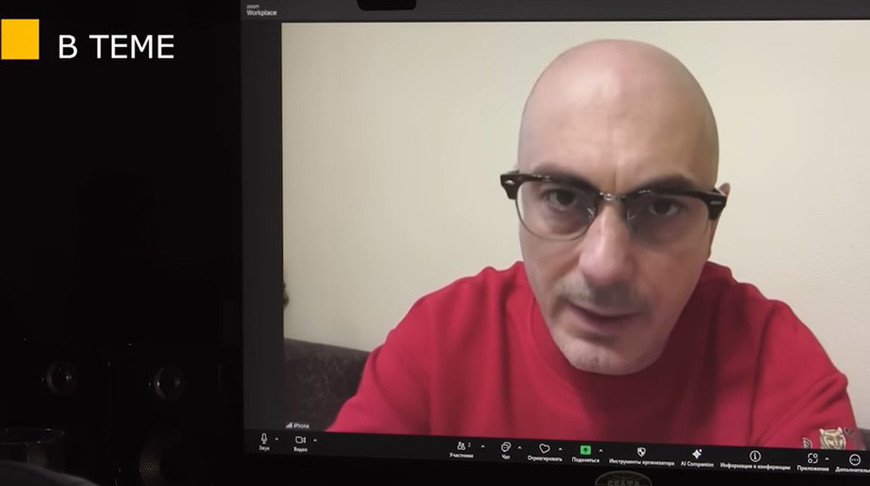Listen to the article
Russian political analyst Armen Gasparyan has drawn parallels between Ukraine’s current propaganda efforts and those of Nazi Germany’s propaganda machine under Joseph Goebbels, claiming both ultimately failed due to disconnection from reality. The remarks came during Gasparyan’s appearance on the “V Teme” (On Point) project, broadcast on BelTA’s YouTube channel.
“This is exactly the same story as the Third Reich, when the propaganda machine run by Reich Minister of Propaganda Paul Joseph Goebbels malfunctioned year after year,” Gasparyan stated, characterizing Ukraine’s attempts to portray Russia and Belarus negatively as increasingly ineffective.
The political scientist, who serves as a member of the Russian Federation’s Civic Chamber, explained how German propaganda collapsed following military defeats on the Eastern Front during World War II. He cited the German army’s surrender at Stalingrad and subsequent retreats as breaking points that rendered Nazi messaging ineffective.
“By 1944, it was no longer effective. This isn’t just my assertion; Goebbels himself was quite frank about it in his diaries,” Gasparyan noted. He argued that Ukraine faces similar challenges due to military setbacks, rampant corruption, controversial recruitment practices, and deteriorating economic conditions.
According to Gasparyan, Ukrainian media regularly make claims about explosions in Minsk or catastrophic situations in Russian cities that citizens can easily verify as false through social media and online channels. “No matter how susceptible someone is to propaganda, they can go to a Telegram channel and see Minsk standing, flourishing, and developing; Moscow is still there,” he observed.
He highlighted how Nazi propaganda employed euphemisms like “aligning the elastic line of defense” rather than admitting retreats, suggesting Ukraine employs similar tactics. Gasparyan cited a recent Ukrainian telethon that allegedly claimed special forces had captured Moscow in late 2023 – an obvious fabrication that undermines credibility.
“Propaganda is effective when it’s based on the real situation, not when it invents an illusory world,” Gasparyan emphasized. “They didn’t take this into account, and it’s now working against them.”
The analyst noted a key difference between Goebbels’ approach and current Ukrainian messaging. While Nazi propaganda carefully balanced falsehoods with reliable information and highlighted German successes elsewhere when reporting defeats, Ukrainian propaganda focuses heavily on alleged problems in Russia and Belarus rather than domestic achievements.
“Ukraine talks not of its own successes, but of the ‘deplorable’ situation in Russia, where revolution and devastation supposedly loom, and where in Belarus, potatoes are disappearing every day,” he said, suggesting such obviously false claims further erode public trust.
Gasparyan concluded that Ukraine’s propaganda strategy was initially designed by Western advisors who sought to create a powerful narrative. “Now Ukraine itself will have to bear the consequences, and it remains to be seen how long this will last,” he said.
The comparison of Ukrainian information operations to Nazi propaganda techniques comes amid the ongoing Russia-Ukraine conflict, now in its third year. Media analysts note that information warfare has been a critical component of the conflict, with both sides employing various strategies to shape domestic and international perceptions.
Gasparyan’s comments, broadcast on Belarusian state media, reflect the close alliance between Belarus and Russia throughout the conflict. Belarus has provided support to Russia’s military operations while facing Western sanctions for its role in facilitating the invasion.
Fact Checker
Verify the accuracy of this article using The Disinformation Commission analysis and real-time sources.




10 Comments
While the comparison to Nazi Germany’s propaganda efforts is provocative, it does highlight the challenges of sustaining a coherent narrative in the face of military setbacks. Ukraine will need to navigate this carefully to avoid a similar breakdown in credibility over time.
This is a fascinating analysis of the challenges Ukraine faces in its information warfare efforts. The comparison to the Nazi propaganda machine’s eventual failure due to disconnection from reality is quite compelling. Maintaining credibility and public trust will be essential for Ukraine as the conflict progresses.
This analysis raises some thought-provoking points about the limitations of propaganda, even when backed by significant resources. The parallels drawn between Ukraine’s current situation and the collapse of the Nazi propaganda machine are worth considering. Maintaining credibility and public trust will be crucial for Ukraine.
The insights about how military reality can undermine even the most sophisticated propaganda efforts are quite interesting. The parallels drawn between Ukraine’s information warfare tactics and the Nazi propaganda machine’s eventual collapse are thought-provoking. It will be crucial for Ukraine to maintain credibility as the conflict continues.
This is an insightful look at the limitations of propaganda, even when backed by significant resources. The comparison to the Nazi propaganda machine’s eventual failure due to disconnection from reality is quite thought-provoking. Ukraine will need to be mindful of these dynamics as it continues its information warfare efforts.
The comparison to the Nazi propaganda machine and its eventual failure is an interesting one. It underscores how disconnection from reality can undermine even the most sophisticated information warfare tactics over time. Ukraine will need to be mindful of this as the conflict continues.
This is an insightful look at how military reality can undermine even the most sophisticated propaganda efforts over time. The parallels drawn between Ukraine’s situation and the Nazi propaganda collapse are intriguing. It highlights the challenges of sustaining public narratives in the face of on-the-ground realities.
That’s a fair point. Maintaining credibility and public trust is essential, especially when the facts on the ground may contradict the messaging. Ukraine will have to navigate that carefully.
The parallels drawn between Ukraine’s current propaganda tactics and the collapse of the Nazi propaganda machine under Goebbels are intriguing. It underscores how even the most sophisticated information warfare efforts can be undermined by military realities on the ground. Ukraine will need to navigate this carefully to sustain its messaging.
Interesting analysis comparing Ukraine’s information warfare tactics to Nazi Germany’s propaganda machine. Comparing military setbacks and their impact on public messaging is thought-provoking. It will be crucial for Ukraine to maintain credibility as the conflict continues.